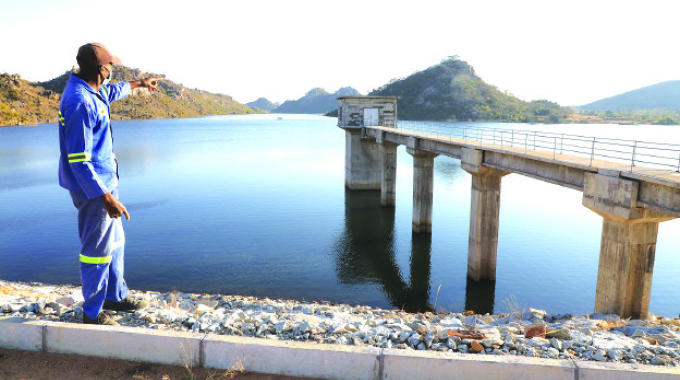My turn: Give credit where it’s due

The programme for the next day had been agreed on. Everything, it appeared, was in place. Attention, therefore, naturally turned to other subjects before settling on politics.
Directing the question to no one in particular, one old timer asked, ‘‘saka imi vakomana kana muchiti VaMugabe vatadza kutonga munorevei chaizvo (what do you mean when you accuse President Mugabe of misrule)?’’
I will not delve into the details of the exchange that followed serve to say none of those who believe Morgan Tsvangirai is the best thing since sliced bread managed to give the old man a satisfactory answer.
I pose the same question to you today. What do you mean when you accuse President Mugabe and Zanu-PF of misrule?
What do you mean, when you say they have run down this country when there is evidence that the economic downturn of the past decade began with the imposition of illegal economic sanctions that, in the words of the United States were designed to make the economy scream?
In the words of former US assistant secretary of state for African affairs, Walter Kansteiner, the sanctions were designed to make the economy scream to separate Zimbabweans from President Mugabe and Zanu-PF? Does that make you a free-thinking individual, if you behave exactly in the manner Western think-tanks envisaged you would when they decided to impose the sanctions and when you fail to establish the link between the Zanu-PF led Government’s decision to acquire land for distribution to the landless majority, and the launch of the MDC which promptly trashed land reforms, promising to return land to white former farmers?
And if that agrarian reform programme was such a disaster, why is it that the much-touted economic turnaround that anti-land reform lobbyists like Tendai Biti harp about is, in their own words, under-pinned and driven by growth in the agricultural sector? Yes, that ‘‘evil’’ Mugabe programme, not the western donors we were made to believe were waiting in the wings to flood Zimbabwe with money, is driving the economic turnaround programme.
And what about the successes in the social services sector that even the sanctions failed to significantly dampen over the past decade? Isn’t that evidence of foresight and people centred leadership on the part of Robert Mugabe and Zanu-PF?
For instance while other countries had to wait for the UN Millennium Summit at which the Millennium Development Goals aimed at alleviating poverty and improve standards of living in the developing world were unveiled in 2000, Zimbabwe had long invested in all seven areas as early as the first decade of independence which is why the office of Deputy Prime Minister Thokozani Khupe sponsored newspaper adverts that declared, ‘‘MDGs: Zimbabwe Takes A Lead In Southern Africa.’’
President Mugabe’s foresight is why today, despite the politicisation of HIV and Aids funding that saw the country get only US$4 per person from the Global Fund for HIV and Aids, TB and Malaria when other countries were getting US$76 per person, Zimbabwe still managed to score big in the fight against HIV and Aids manifest in the progressive decline of HIV prevalence from a high of over 30 percent 10 years ago, to the current national average of 13, 7 percent.
And this decline has been attributed to Government’s progressive decision to introduce an Aids levy and the National Aids Council that has structures that ensure that funding cascades right down to the man at the grassroots.
These innovations are unparalleled in Africa as many countries are, in fact, still struggling to identify strategies that could prevent HIV incidence and prevalence.
What is more despite the brain drain that afflicted the health sector over the past decade, benefiting countries like the rabble-rousing Britain, the Ministry of Health reports that nursing vacancies have been filled countrywide and Government is struggling to accommodate graduates who are being churned out by training institutions countrywide.
And only this week, there was a massive vote of confidence in the University of Zimbabwe’s College of Health Sciences that has been selected by the United States to train 140 000 African health care workers over five years.
The college will receive US$130 million from the Medical Education Partnership Initiative towards the training programme expected to improve the health delivery system across Africa.
Under the programme, the College of Health Sciences will partner with the University of Colorado-Denver, Stanford University, the University of Cape Town, University College of London and King’s College London’s Institute of Psychiatry.
What is more, despite the decade of sanctions that negatively impacted on Government’s capacity to fund education and pay teachers competitive salaries, a development that prompted skills flight into the region and other countries, Zimbabwe managed to rise to number one in Africa in terms of literacy rates having played second fiddle to Tunisia over the past few years. According to a study by the United Nations Development Programme, Zimbabwe’s literacy rates increased from 85 percent to 92 percent overtaking Tunisia to become the most literate society in Africa.
This remarkable achievement was a culmination of the massive investments made into the education sector by government which adopted a policy of education for all at independence in 1980.
This success so peeved detractors that even the man who should have beaten the loudest drum; Education, Sport, Arts and Culture Minister David Coltart feebly tried to dismiss the ranking claiming the UNDP study was flawed.
‘‘With no text books and no teachers, we must not think that all is well. Our literacy rates may not be as high as we think they are. We have several other indicators up there. Our education system is in a crisis and we need to do a lot of work to restore the quality of education for our children’s sake,” Coltart told the Standard.
Yeh right! We have never heard these same questions raised over other reports that seek to portray Zimbabwe as a pariah state, notably from groupings like Amnesty International or Reporters without Borders that always give Zimbabwe low rankings on the corruption perception and press freedom indices.
Coltart’s reasoning: ‘‘The UNDP relied on figures showing attendance at school for the first four years of formal education as indicators of literacy rates when Grade Seven results will be a more accurate indicator.’’
As a lawyer, Coltart obviously went to school and should know that literacy is defined as the ability to read and write. We all know that even before the first year of schooling is out, first graders, unless severely retarded, will be able to read and write.
The real reason for Coltart’s ranting is, however, not lost to me. Such findings like the UNDP’s put Mugabe in good light and should be trashed to sustain the myth of successive, useless Zanu-PF governments. Let’s give credit where it is due please.
I am one of the people still to be convinced that the MDC has anything to offer Zimbabweans, but should they do, I will not begrudge them their contribution.
Zimbabwe’s success in education and human resources development explains why our chief export over the past decade has been well-educated and trained professionals who occupy critical sectors in the economies of sister countries in the region and abroad.
If Coltart is blind to this, then he needs to have his head examined.
While it would be easy to dismiss Coltart’s thinking as a manifestation of the usual MDC mantra that tries to trash any and everything that can remotely credit Zanu-PF, it raises questions of the implications of having people with such thinking overseeing critical social services portfolios particularly when problems in such sectors are deemed as sources of protest votes? Were the MDCs demand for these portfolios motivated by the need to serve or was there another reason linked to the regime agenda?
I wonder, and leave you to ponder.








Comments